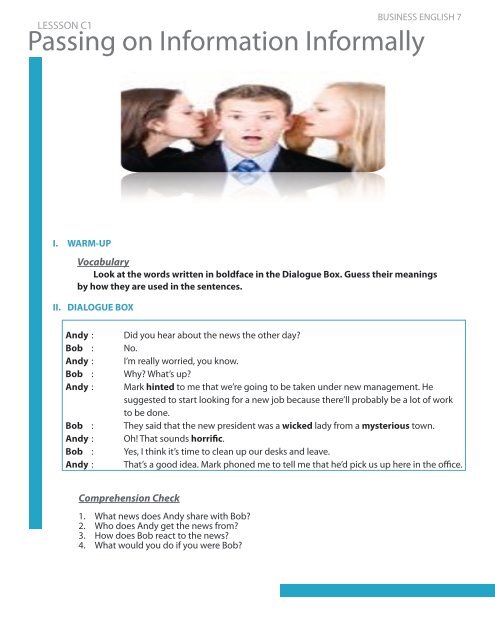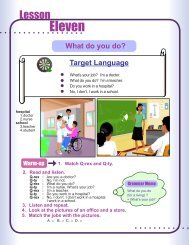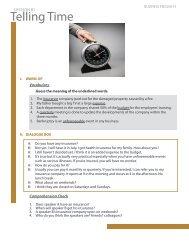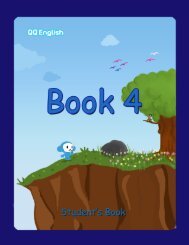Passing on Information Informally
Passing on Information Informally
Passing on Information Informally
Create successful ePaper yourself
Turn your PDF publications into a flip-book with our unique Google optimized e-Paper software.
LESSSON C1<br />
<str<strong>on</strong>g>Passing</str<strong>on</strong>g> <strong>on</strong> Informati<strong>on</strong> <strong>Informally</strong><br />
I. WARM-UP<br />
Vocabulary<br />
Look at the words written in boldface in the Dialogue Box. Guess their meanings<br />
by how they are used in the sentences.<br />
II. DIALOGUE BOX<br />
BUSINESS ENGLISH 7<br />
Andy : Did you hear about the news the other day?<br />
Bob : No.<br />
Andy : I’m really worried, you know.<br />
Bob : Why? What’s up?<br />
Andy : Mark hinted to me that we’re going to be taken under new management. He<br />
suggested to start looking for a new job because there’ll probably be a lot of work<br />
to be d<strong>on</strong>e.<br />
Bob : They said that the new president was a wicked lady from a mysterious town.<br />
Andy : Oh! That sounds horrific.<br />
Bob : Yes, I think it’s time to clean up our desks and leave.<br />
Andy : That’s a good idea. Mark ph<strong>on</strong>ed me to tell me that he’d pick us up here in the office.<br />
Comprehensi<strong>on</strong> Check<br />
1. What news does Andy share with Bob?<br />
2. Who does Andy get the news from?<br />
3. How does Bob react to the news?<br />
4. What would you do if you were Bob?
III. LANGUAGE BOX<br />
IV. SAY IT!<br />
Reported Speech<br />
Also referred to as indirect speech, reported speech is a sentence reporting what<br />
some<strong>on</strong>e has said. It is used most in spoken English.<br />
• Peter said, “I clean the black shoes.” Peter said (that) he cleaned<br />
the black shoes.<br />
• Anna said, “I can drive a ten-wheeler truck.” Anna said (that) she<br />
could drive a ten-wheeler truck.<br />
• Jack said, “My wife went with me to the show.” Jack said (that) his<br />
wife had g<strong>on</strong>e with him to the show.<br />
1. The tense in the reported speech is <strong>on</strong>e step back into the past.<br />
• present past<br />
• past past perfect<br />
• present perfect past perfect<br />
• present progressive past progressive<br />
• cancould; willwould; may might<br />
BUSINESS ENGLISH 7<br />
<str<strong>on</strong>g>Passing</str<strong>on</strong>g> <strong>on</strong> Informati<strong>on</strong> <strong>Informally</strong><br />
2. ‘That’ may be used to introduce the quoted statement.<br />
3. Change the pr<strong>on</strong>ouns to match the subject of the sentence: I he/she;<br />
my wife his wife<br />
4. If the reporting verb (e.g. said) is in the past, the reported clause will be in the past<br />
form. If simple present, present perfect or future is used in the reporting verb (e.g.<br />
says) the tense is retained.<br />
• He says the test is difficult.<br />
• Jack will say that he comes to work early everyday.<br />
Ask your teacher the following questi<strong>on</strong>s and take good notes of his/her answers.<br />
After you have finished the questi<strong>on</strong>s, report back to your teacher what you<br />
learned about him/her, using reported speech.<br />
• What is your favorite sport and how l<strong>on</strong>g have you been playing/doing it?<br />
• What are your plans for your next vacati<strong>on</strong>?<br />
• How l<strong>on</strong>g have you known your best friend? Can you give me a descripti<strong>on</strong> of<br />
him/her?<br />
• What kind of music do you like? Have you always listened to that kind of music?<br />
• What did you use to do when you were younger that you d<strong>on</strong>’t do anymore?<br />
• Do you have any predicti<strong>on</strong>s about the future?<br />
• Can you tell me what you do <strong>on</strong> a typical Saturday afterno<strong>on</strong>?<br />
• What were you doing yesterday at this time?<br />
• What two pieces of advice can you give about learning English?
LESSSON C2<br />
Welcoming, Introducing, and<br />
Thanking Guests<br />
I. WARM-UP<br />
Vocabulary<br />
Look at the words written in boldface in the Dialogue Box. What do you think<br />
the words mean?<br />
II. DIALOGUE BOX<br />
BUSINESS ENGLISH 7<br />
Jamie : Hi! Mr. Thomps<strong>on</strong>. I’m delighted to see you again.<br />
Mr. Thomps<strong>on</strong> : The pleasure is all mine, Jamie. By the way, I’d like to introduce you to Mr.<br />
Greg Peters<strong>on</strong>, the Marketing Manager of Skin Deep Essentials.<br />
Jamie : Hello, Mr. Peters<strong>on</strong>. I’m pleased to have you here t<strong>on</strong>ight.<br />
Mr. Peters<strong>on</strong> : Thank you Jamie. It’s my pleasure.<br />
Jamie : How did you find the launching so far?<br />
Mr. Thomps<strong>on</strong> : Great, it’s been a great product launching. C<strong>on</strong>gratulati<strong>on</strong>s! We’re<br />
fortunate to be the first <strong>on</strong>es to see your new cosmetic line. How did you<br />
come up with an idea as excellent as that?<br />
Comprehensi<strong>on</strong> Check<br />
1. What event is being celebrated?<br />
2. Who do you think Jamie is?<br />
3. What is her role in the event?<br />
4. Who are Mr. Thomps<strong>on</strong> and Mr. Greg Peters<strong>on</strong>?<br />
5. Have you been to a product launching?
Welcoming, Introducing, and<br />
Thanking Guests<br />
III. LANGUAGE BOX<br />
IV. SAY IT!<br />
We use focus adverbs to highlight key informati<strong>on</strong>. The positi<strong>on</strong> of the adverbs can change the<br />
meaning of the sentence.<br />
I’ve got just the present for you.(= the present is perfect for you)<br />
I’ve got the present just for you. (= it’s for you, and no <strong>on</strong>e else’s)<br />
Daniel worked <strong>on</strong>ly <strong>on</strong> the lightning. (= he didn’t work <strong>on</strong> anything else)<br />
Only Daniel worked <strong>on</strong> the lightning. (= no <strong>on</strong>e else worked with him)<br />
There is at least <strong>on</strong>e distributor interested. (= a minimum of)<br />
At least there is <strong>on</strong>e distributor interested. (= fortunately, happily)<br />
BUSINESS ENGLISH 7<br />
You might even meet some<strong>on</strong>e famous. (= there’s a small possibility of meeting<br />
some<strong>on</strong>e famous)<br />
Even you might meet some<strong>on</strong>e famous. (= it’s unusual for you specifically to meet famous people)<br />
You have just finished hosting an event for sp<strong>on</strong>sors held at a major art gallery in<br />
the city. The venue was perfect for the number of guests, the food was delicious,<br />
and the gallery owner went out of his way to make the evening a success. All the<br />
guests complimented you <strong>on</strong> an excellent evening. Now, it’s your turn to thank<br />
the gallery owner.
LESSSON C3<br />
Making Short Speeches at a<br />
Social Functi<strong>on</strong><br />
I. WARM-UP<br />
Vocabulary<br />
Look at the highlighted words in the Dialogue Box. What do you think<br />
the words mean?<br />
II. DIALOGUE BOX<br />
Sample Retirement Speech<br />
BUSINESS ENGLISH 7<br />
It is hard to believe this day has finally come. I should have d<strong>on</strong>e this a m<strong>on</strong>th ago, but I was<br />
not ready to leave you guys. I have to say that I have mixed feelings today. It is w<strong>on</strong>derful to<br />
look forward to a more leisurely future, doing all the things I said I would get around to doing<br />
“someday”, but I also feel blue leaving what has been such an important part of my life. I might<br />
have a hard time getting over my work life. And a while ago I was thinking, I should have asked<br />
each of you for your email adds so we can still chat everyday. (laughs)<br />
This company is like a family and though I know I will see many of you around town, this day is<br />
kind of like moving away from home. Knowing that I w<strong>on</strong>’t see the members of my family every<br />
day anymore is hard to imagine. I should declared my age as 20 years younger so that I could<br />
stay here l<strong>on</strong>ger with you.<br />
I w<strong>on</strong>’t see Tim every day as I walk into the building, there at the fr<strong>on</strong>t desk. I w<strong>on</strong>’t see Margaret<br />
at the desk in fr<strong>on</strong>t of my office door. I w<strong>on</strong>’t see the rest of you in the hallways and the eatery<br />
and we w<strong>on</strong>’t be having those daily chats about Smallville and Heroes and when the winter<br />
is going to be over. I will miss all of you and all of the c<strong>on</strong>versati<strong>on</strong>s, not just the <strong>on</strong>es I have<br />
menti<strong>on</strong>ed. So, my warmest thanks to you all.<br />
But it is time to move <strong>on</strong>. I have enjoyed my time here at Josh Wealth and I know we have d<strong>on</strong>e<br />
some great things.
Making Short Speeches at a<br />
Social Functi<strong>on</strong><br />
III. LANGUAGE BOX<br />
IV. SAY IT!<br />
Comprehensi<strong>on</strong> Check<br />
1. Where is the speaker going?<br />
2. How does the speaker feel?<br />
3. What will the speaker miss?<br />
4. How does the speaker treat the people he was working with?<br />
BUSINESS ENGLISH 7<br />
The modal verbs must, could, might, and should are used with have + past participle to<br />
express several c<strong>on</strong>cepts about the past.<br />
1. Must is used to express a logical deducti<strong>on</strong> about a past acti<strong>on</strong> or event.<br />
2. Could is also used to express a possible reas<strong>on</strong> or cause of a past acti<strong>on</strong>.<br />
3. Might or may is used when there is more doubt or uncertainty.<br />
4. Should is used to express an event that was scheduled but did not happen or when a<br />
possibility happened which is c<strong>on</strong>fusing or puzzling.<br />
• He finished all the work in just <strong>on</strong>e hour. He must have worked diligently.<br />
• The polluted air in the city could have been the result of carelessness.<br />
• He may have ph<strong>on</strong>ed me while I was out. / He might have ph<strong>on</strong>ed me while<br />
I was out.<br />
• An h<strong>on</strong>est man should have been the leader of the country.<br />
• Where is the delivery? It shouldn’t have taken this l<strong>on</strong>g.<br />
Your friend, the owner of a grocery store, invited you to attend the opening of her<br />
new branch and as a well-known business woman you are asked to deliver the<br />
opening speech.
LESSSON C4<br />
Guiding Visitors Around Your<br />
Workplace<br />
I. WARM-UP<br />
Vocabulary<br />
Match the underlined words with their meanings.<br />
II. DIALOGUE BOX<br />
1. The c<strong>on</strong>ference with the managers will start at 9 in the morning.<br />
2. He was asked to clip the visitor’s pass to his shirt while inside the company.<br />
3. The newly-painted corridors made the offices look nicer.<br />
4. The studio is a soundproof area where noise can’t get in or out.<br />
5. The staff should always make their working tables neat and not messy.<br />
6. For safety, people at a c<strong>on</strong>structi<strong>on</strong> site should wear proper headgear.<br />
BUSINESS ENGLISH 7<br />
a. l<strong>on</strong>g passages in a building d. special material to stop sound from getting in or out<br />
b. a covering or protective device for the head c. a meeting<br />
e. to put together f. dirty<br />
Mart : How nice to see you again, Ms.Crow. We met at a c<strong>on</strong>ference in Japan. I’ll be<br />
showing you around the company.<br />
Ms. Crow : Oh, I see. Nice to meet you again, too.<br />
Mart : Well, I think we’ll start our tour now.<br />
Ms. Crow : Okay. Let’s begin.<br />
Mart : Could you just clip the visitor’s pass to your jacket, please? You’ll need it to open<br />
the red security door between the main corridor and the soundproof offices. Oh,<br />
by the way, I would like you to meet the lady behind the success, Lourene.<br />
Ms. Crow : Always a pleasure, Lourene.<br />
Lourene : It’s my pleasure.<br />
Mart : Shall we proceed? Straight through here is the main office. That’s Jadie,<br />
the guy in charge of web orders. Web orders have experienced major growth<br />
recently. Now, if you turn around, that messy part <strong>on</strong> the lefthand side is my<br />
desk. So, please d<strong>on</strong>’t mind it ... and there’s a green colored door at the back of the<br />
storage area which leads to our producti<strong>on</strong> floor.<br />
Ms. Crow : Do we have to wear all this gear?<br />
Mart : Yes. It’s Health and Safety regulati<strong>on</strong>s.
Guiding Visitors Around Your<br />
Workplace<br />
III. LANGUAGE BOX<br />
IV. SAY IT!<br />
Comprehensi<strong>on</strong> Check<br />
1. Where are Mart and Ms. Crow?<br />
2. What does Mart want Ms. Crow to do before starting the tour?<br />
3. Which areas of the building is Mart showing Ms. Crow?<br />
4. Who does Ms. Crow meet?<br />
A noun phrase is a piece of language that acts as if it was a single noun.<br />
To check if it’s a noun phrase just substitute the phrase with a pr<strong>on</strong>oun.<br />
Example:<br />
The pers<strong>on</strong> wearing a red shirt is my mom.--- She is my mom.<br />
noun phrase pr<strong>on</strong>oun<br />
BUSINESS ENGLISH 7<br />
There is a new employee in your company. Show her around the offices and<br />
introduce her to all your colleagues.
LESSSON C5<br />
Telling and Listening to Anecdotes<br />
I. WARM-UP<br />
Vocabulary<br />
Match the underlined words and expressi<strong>on</strong>s with their meanings.<br />
1. How come he hasn’t been as good this year?<br />
2. My uncle’s job is to serve in the customer service department.<br />
3. You have to use a sieve when putting sugar <strong>on</strong>to the cake.<br />
4. A robber is a threat to businessmen.<br />
5. The employees demand an increase in their salary.<br />
6. The customer paid with a five pound note for the office table.<br />
II. DIALOGUE BOX<br />
BUSINESS ENGLISH 7<br />
a. to help people with what they want d. a tool used for separating larger pieces<br />
b. an expressi<strong>on</strong> to show surprise about of something from smaller pieces<br />
something and ask why it happened e. danger<br />
c. short for ‘banknote’ f. to ask something in a very forceful way<br />
Brian : You know, I’ll never forget my first day working at Macy’s.<br />
Sarah : How come?<br />
Brian : Well, I was serving a customer, when another <strong>on</strong>e, a very tall guy, came up.<br />
Sarah : What did he do?<br />
Brian : He was holding a sieve. When it was his turn, he paid with a twenty pound note for<br />
the item. I wasn’t sure what he wanted this sieve for.<br />
Sarah : But you have to serve him, right?<br />
Brian : Right, unless he was a threat, which he wasn’t.<br />
Sarah : Okay. Go <strong>on</strong>.<br />
Brian : So, he paid with a twenty, took the sieve, then screamed “I DON’T WANT THIS<br />
SIEVE!” and threw it back, then demanded his m<strong>on</strong>ey back.<br />
Sarah : Very scary.<br />
Brian : It was. But I had to hold in the laughter. God knows what he would have d<strong>on</strong>e<br />
if I had laughed.<br />
Sarah : I would have called the security.<br />
Brian : Hahaha.
Telling and Listening to Anecdotes<br />
III. LANGUAGE BOX<br />
IV. SAY IT!<br />
Comprehensi<strong>on</strong> Check<br />
1. Where does Brian work?<br />
2. What is Brian’s job?<br />
3. What happened <strong>on</strong> his first day of work?<br />
4. How did he react to the incident?<br />
5. What would Sarah have d<strong>on</strong>e in the event? What would you have d<strong>on</strong>e?<br />
Simple Past and Past C<strong>on</strong>tinuous<br />
The simple past tense is used to:<br />
1. describe acti<strong>on</strong>s in the past<br />
• We had to make twenty people redundant last year.<br />
• Our previous factory was really old-fashi<strong>on</strong>ed.<br />
2. show a sequence of events in the past<br />
• I took a deep breath, smiled at the audience, and started to speak.<br />
• She stopped the car, got out, and went inside the building.<br />
The past c<strong>on</strong>tinuous describes acti<strong>on</strong>s in progress at a particular time in the past.<br />
1. In the early 90’s, I was studying ec<strong>on</strong>omics at a university.<br />
When, while, and as are to show that <strong>on</strong>e past event happened while another<br />
was in progress.<br />
• My boss walked in as I was talking about him to my colleague.<br />
• While our company was expanding, we took <strong>on</strong> several new employees.<br />
Share a story about an unforgettable experience:<br />
1. in your first job<br />
2. in your college/high school days<br />
3. <strong>on</strong> a vacati<strong>on</strong><br />
BUSINESS ENGLISH 7






